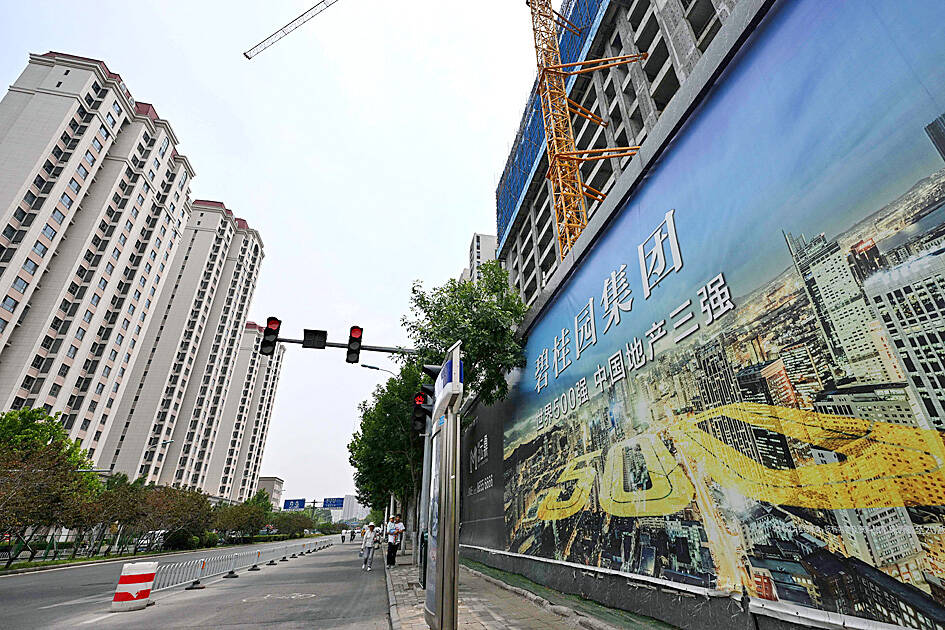Two global credit ratings firms lowered their forecasts for China’s property market, as an accelerating slump in home prices hampers the country’s efforts to rescue the sector.
S&P Global Ratings now expects residential sales to drop 15 percent this year, more than the 5 percent decline it projected earlier. That would put sales below 10 trillion yuan (US$1.4 trillion), about half the peak in 2021, the ratings company said on Thursday.
Fitch Ratings on Wednesday cut its annual sales estimate to a decrease of 15 to 20 percent, worse than an earlier estimate of a 5 to 10 percent drop.

Photo: AFP
The ratings firms’ bleaker outlook suggests they have little confidence that recent stimulus measures would end the property slump that has been dragging the world’s second-largest economy.
The institutions blame a bigger-than-expected drop in home prices, which deters buyers.
Values of new homes fell the most in almost a decade last month, while used-home prices had the sharpest decline in at least 13 years, official figures showed last week.
Real estate accounts for about 78 percent of household wealth in China — double the US rate — and families typically save for years, and borrow from friends and relatives to purchase a home.
Separately, a measure of foreign direct investment (FDI) in China declined for the 12th straight month, underscoring Beijing’s struggle to improve its appeal to overseas investors to boost growth.
Inbound FDI in China dropped 28.2 percent in the first five months of this year from the same period last year to 412.51 billion yuan (US$56.8 billion), data released by the Chinese Ministry of Commerce on Friday showed. The figure was worse than the 27.9 percent drop in April and extended a streak since June last year.
The ministry said FDI fell in January-to-May mainly because of a high comparison base and reiterated authorities have increased efforts to attract foreign investment since the beginning of the year.

NEW IDENTITY: Known for its software, India has expanded into hardware, with its semiconductor industry growing from US$38bn in 2023 to US$45bn to US$50bn India on Saturday inaugurated its first semiconductor assembly and test facility, a milestone in the government’s push to reduce dependence on foreign chipmakers and stake a claim in a sector dominated by China. Indian Prime Minister Narendra Modi opened US firm Micron Technology Inc’s semiconductor assembly, test and packaging unit in his home state of Gujarat, hailing the “dawn of a new era” for India’s technology ambitions. “When young Indians look back in the future, they will see this decade as the turning point in our tech future,” Modi told the event, which was broadcast on his YouTube channel. The plant would convert

‘SEISMIC SHIFT’: The researcher forecast there would be about 1.1 billion mobile shipments this year, down from 1.26 billion the prior year and erasing years of gains The global smartphone market is expected to contract 12.9 percent this year due to the unprecedented memorychip shortage, marking “a crisis like no other,” researcher International Data Corp (IDC) said. The new forecast, a dramatic revision down from earlier estimates, gives the latest accounting of the ongoing memory crunch that is affecting every corner of the electronics industry. The demand for advanced memory to power artificial intelligence (AI) tasks has drained global supply until well into next year and jeopardizes the business model of many smartphone makers. IDC forecast about 1.1 billion mobile shipments this year, down from 1.26 billion the prior

People stand in a Pokemon store in Tokyo on Thursday. One of the world highest-grossing franchises is celebrated its 30th anniversary yesterday.

Zimbabwe’s ban on raw lithium exports is forcing Chinese miners to rethink their strategy, speeding up plans to process the metal locally instead of shipping it to China’s vast rechargeable battery industry. The country is Africa’s largest lithium producer and has one of the world’s largest reserves, according to the US Geological Survey (USGS). Zimbabwe already banned the export of lithium ore in 2022 and last year announced it would halt exports of lithium concentrates from January next year. However, on Wednesday it imposed the ban with immediate effect, leaving unclear what the lithium mining sector would do in the